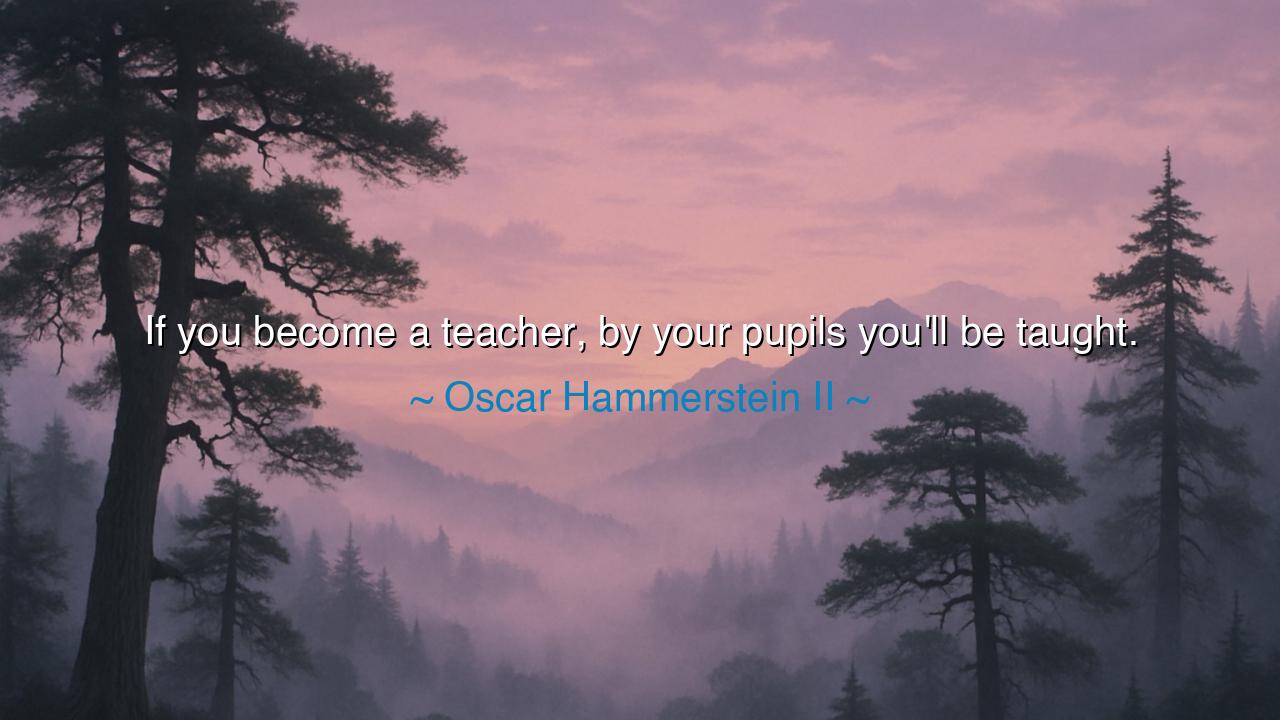
If you become a teacher, by your pupils you'll be taught.






“If you become a teacher, by your pupils you’ll be taught.” So wrote Oscar Hammerstein II, the great American lyricist and philosopher of the human heart, whose words often hid profound truths beneath their simple grace. In this line, drawn from the musical The King and I, Hammerstein gives voice to an eternal law — that the one who teaches must also be willing to learn, and that wisdom flows not in one direction, but in a sacred circle. To teach is to open oneself not only to give, but also to receive; for the teacher who listens grows, and the pupil who questions becomes the mirror that reveals the teacher’s own soul.
In this quote, Hammerstein does more than speak of education — he speaks of humility, of the rhythm of life itself. For every act of teaching is an act of self-discovery. The teacher enters the classroom thinking they possess knowledge to bestow, yet soon finds that the act of explaining deepens their own understanding. The child’s innocent question, the student’s new perspective, the unimagined challenge — all these become lessons for the master. In this way, the teacher becomes both guide and traveler, learning anew the very path they thought they had mastered. Thus, teaching is not a monologue, but a dialogue between souls.
The ancients understood this truth well. Socrates, the father of philosophy, claimed to know nothing — yet through questioning others, he awakened knowledge in himself and in them. His method, the elenchus, was not built on authority, but on humility. In every conversation, he let his “pupils” teach him how to see anew. Each question, each contradiction, was a mirror held before his own mind. So too, Hammerstein’s words remind us that no one truly possesses wisdom; we merely share in its light, passing it from one heart to another, and in the exchange, we are all transformed.
We see this truth echoed in the story of Anne Sullivan and Helen Keller. Anne, though the teacher, found herself reshaped by her pupil’s courage and will. She entered Keller’s life believing she would bring her light, yet found herself illuminated by the brilliance of Helen’s spirit. Through teaching her blind and deaf student to speak and to write, she learned patience, resilience, and a deeper understanding of what it means to communicate. Each day of teaching was also a day of learning — not of facts, but of compassion and the boundless capacity of the human heart.
Hammerstein’s quote also speaks to the moral dimension of teaching. To be a teacher is not merely to train minds, but to shape souls — and in doing so, one’s own soul is refined. The teacher must confront their own pride, their own limitations, their own ignorance. For it is easy to stand above one’s students and claim authority; it is far harder to kneel beside them and learn together. Yet it is only in this humility that education becomes transformation. The teacher who listens with wonder becomes the eternal student, and thus never ceases to grow.
But this truth extends far beyond the walls of the classroom. Each of us, in life, becomes both teacher and student. Parents are taught by their children; leaders by those they lead; friends by those they love. Every encounter, every relationship, carries within it the potential for mutual learning. The world itself is the grandest classroom — and to those who walk through it with open eyes, every person becomes a teacher, every mistake a lesson, every silence a text to be read.
So, my listener, remember this sacred balance: to teach is to serve, but to learn is to live. When you speak, speak to enlighten; when you listen, listen to be changed. Do not seek to dominate with your wisdom, but to share in the dance of understanding. If ever you find yourself in the place of the teacher — whether in a school, in your home, or in your heart — remember Hammerstein’s words. Approach your pupils not as inferiors, but as mirrors of truth, whose questions will teach you to see the world anew.
And thus, let this be your guiding lesson: the true teacher is never finished learning, and the true student never ceases to teach. For wisdom is not a mountain to be climbed alone, but a river that flows between hearts. Drink deeply of it, give freely of it, and let it humble you — for in every exchange of knowledge, the giver and the receiver are made greater together.






AAdministratorAdministrator
Welcome, honored guests. Please leave a comment, we will respond soon